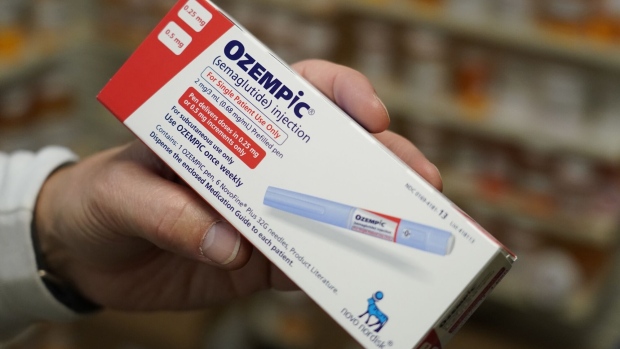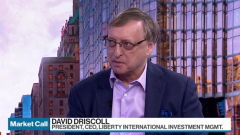Feb 19, 2024
Ozempic Means Junk-Food Makers Need Course Correction
, Bloomberg News

(Bloomberg) -- Companies selling unhealthy foods need to tweak their business models to counter the growing popularity of weight-loss drugs — or risk alienating investors, according to the latest Bloomberg Markets Live Pulse survey.
Nearly three out of four respondents said companies making or marketing sugary, fatty or ultra-processed foods should revise their game plans, either by shrinking portions, adjusting recipes or offloading assets altogether. Just over a quarter of the 303 respondents think Big Food can wait out the emerging threat from appetite-suppressing drugs like Zepbound, Ozempic and Wegovy.
“The challenge in the developed world is less about increasing calorie consumption and more about shifting those calories towards healthier foods,” said Mayssa Al Midani, lead manager of Pictet Asset Management’s nutrition fund. “We need to make sure that we’re invested in the companies that have the right category exposures, as well as the ones that have the capability of innovating and adapting to these times.”
Unhealthy foods have been unwelcome in some investors’ portfolios for years. But it was mostly limited to money managers with a focus on environmental, social and governance (ESG) issues, never gaining the kind of calls for widespread divestment that have at times rocked the fossil fuels, gambling and firearms sectors. That’s changing, largely due to the new class of drugs prescribed for diabetes and obesity.
“Considering unhealthy food as ‘the new coal’ is quite powerful,” said Kate Hewitt, an ESG and impact specialist at Montanaro Asset Management. “There are some important distinctions, but just as the shift away from coal is driven by the urgent need to address climate change, moving away from unhealthy diets is critical in tackling obesity and its associated non-communicable diseases and health costs.”
The treatments, which Bloomberg Intelligence estimates could be an $80 billion market in 2030, slow digestion and help users feel fuller longer. It’s already having an impact on food. Walmart Inc., the US’s biggest food retailer, said in October the meteoric rise of the drugs was starting to reduce the total calories bought by shoppers. Earlier this month, the chief executive officer of Ozempic-maker Novo Nordisk A/S said he was getting calls from “scared” food CEOs looking for details on the new drugs.
Read more: Ozempic Users Cut Grocery Spending by Up to 9%
Nearly one in four respondents in the survey said they have already made changes to their investment decisions because of the popular medications, while just 15% said new obesity-treatment news won’t move markets going forward. For the large swath of respondents who do see major developments ahead, most expect the next big breakthrough will be a pill or other more convenient option that helps people shed pounds without the drawbacks of a weekly injection. Novo has already developed an oral version, but it requires large amounts of the active ingredient semaglutide, also used in the injectable versions. The drugmaker has said it needs to figure out how best to manage supply.
If the drugs really take off, which we’ll know more clearly in five or 10 years, “then there’s definitely going to be long-term impact on the growth rates for alcohol, snacks, smoking, gambling and some health-care companies,” said Gareth Powell, head of health care at Polar Capital, which holds drugmaker Eli Lilly & Co. in some of its funds.
The treatments are intended to be a permanent regimen, though with hefty list prices and potential side effects like nausea, it’s unlikely all patients will continue to use them indefinitely. The majority of MLIV Pulse respondents don’t expect much market impact from the treatments beyond the food and health industries, but some say the fashion and travel sectors might benefit.
To be sure, the impact won’t be all bad for food companies. Restaurants and retailers that already market their offerings as healthier, like Chipotle Mexican Grill Inc., are hopeful they’ll see an uptick in business if shoppers become more discerning about food preparation. Nestle SA, widely known for its chocolate bars and Nesquik flavored milks, is working on products like supplements that could complement weight-loss treatments. Retailers with in-house pharmacies will also see a boost from the medication sales themselves.
Eli Lilly, whose recently approved Zepbound is predicted to become the best-selling drug in history, is one of the biggest winners in the stock market this year. By contrast, one-time market darling Tesla Inc. has logged a double-digit drop since the start of 2024. Earlier this year, Eli Lilly overtook the carmaker in market value, leading some to call for the drugmaker to replace Elon Musk’s automaker in the so-called Magnificent Seven group of high-performing mega-cap stocks. More than half of respondents think Eli Lilly should be added, either through replacing Tesla or by rebranding it the Magnificent Eight.
“It’s had a monster rally that has elevated its market cap into the Magnificent category,” said Neil Wilson, chief market analyst at financial services company Finalto. Eli Lilly is also well placed for a long-term future where people live longer and eventually become more sedentary, he said, calling the stock “a great bet on the future of the way the economy works.”
Read full results: Anti-Obesity Pill Would Be Market-Moving
The MLIV Pulse survey is conducted weekly among Bloomberg readers on the terminal and online by Bloomberg’s Markets Live team, which also runs the MLIV blog.
--With assistance from Madison Muller.
(Adds word bubble, link to full results)
©2024 Bloomberg L.P.





